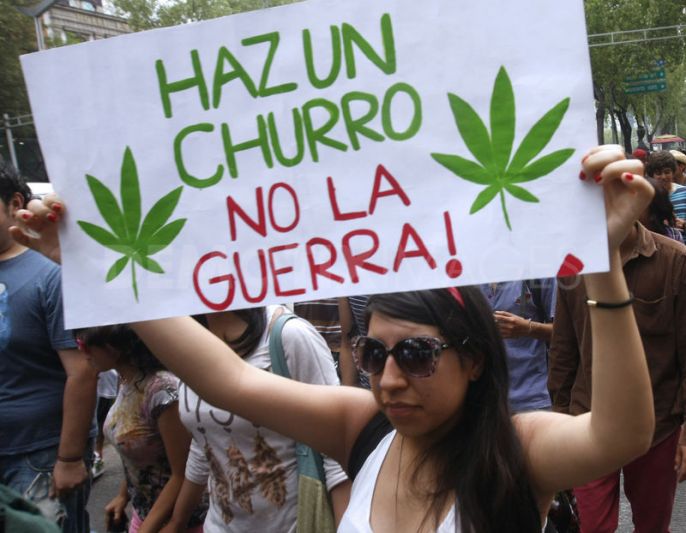
BY PAUL ELISH:
Having turned 21 recently, there’s essentially one thing on my mind these days: drugs. For me, the big 2-1 signified major changes. First, the Tuesday birthday set the revolutionary precedent of placing “going to a bar” ahead of “studying for a Wednesday midterm” and “procrastinating while studying for a Wednesday midterm.” As a Colorado expat, my 21st birthday also marks the beginning of opportunities to buy marijuana out west, if I so desire.
I haven’t been alone in musing about drugs. The Mexican Drug War has lately burst back into the international news spotlight with the capture of notorious drug lord Joaquin “El Chapo” Guzmán and with vigilante activity against cartels in Michoacán. These headlines belie even greater sea changes in Western Hemispheric drug policy. In January, President Obama gave a nod to marijuana legalization in Colorado and Washington, referencing disproportionate punishment of people of color when it comes to pot use. In South America, Uruguay voted to legalize marijuana in 2013. Even Mexico City has been debating pot legalization as various sectors increasingly want to demilitarize what they view as a public health concern. The transnational nature of narcotrafficking is being mirrored by transnational debates on how we want to approach drug law enforcement in the Western Hemisphere.

Regarding the marijuana legalization debate in the U.S., I will always be skeptical of tendencies to paint marijuana as more dangerous than alcohol, but a less readily considered consequence of legalization could be its effects on cartels. Reading about my Colorado city’s first (and only) dispensary, I’m struck by the level of security required for the operation. On that note, I have to give at least a little thought to the semi-sensationalist claims that Colorado pot shops are “likely targets of cartels.” This Fox News article alleges that cartels could infiltrate the legal Colorado market through money laundering and blackmail of pot shop owners, all while sustaining an existence in the black market.
I suspect the above article gives too much credit to Colorado’s ability to single-handedly determine the financial welfare of Mexican drug kingpins. Nonetheless, a number of news sources conclude that legalization will indeed “hurt” cartels, which seems just vague enough to be spot on. At the most basic level, it is important to remember that a pot sale is especially lucrative for Mexican cartels given that marijuana can be grown successfully in Mexico, eliminating Andean dealings that are otherwise involved in cocaine trafficking.

An article from The Washington Post about “How marijuana legalization will affect Mexico’s cartels, in charts” is also a useful resource on the subject, especially if one is seeking evidence downplaying the effect on cartels. The article cites a Stanford expert’s pie chart that shows marijuana representing 17% of cartel revenues. The chart makes it evident that cartels don’t live on pot alone, so cocaine, methamphetamines, and non-drug activities (e.g. human smuggling and kidnapping) could help them weather legalization. What’s more, Colorado and Washington hardly put a dent in marijuana cash flow compared to “bigger” places like Texas.
Ultimately, the wait-and-see approach appears to be the order of the day with reference to the consequences of legalizing pot in the U.S. and abroad, and with reference to the changing dynamics of the War on Drugs. At the moment, things generally seem to be on the up-and-up. Mexican President Peña Nieto is triumphantly tweeting about the capture of El Chapo and resulting possibilities for smaller-scale cartels, Colorado Governor John Hickenlooper is getting psyched about extra dough rolling in from pot taxes, and I’m contenting myself with my unquestionably legal, questionably advisable escapades in New Haven’s bar scene. Even so, I, along with many policy-makers, will be interested to see what we’re saying on the subject of drug reform in the near and distant future.
Paul Elish ’15 is in Saybrook College. As a Notebook blogger, Paul covers Latin American politics and culture, both regionally and in New Haven. Contact him at paul.elish@yale.edu.